You searched for: 六合彩预测,六合彩开奖结果2022,六合彩开奖时间,【六合彩官网∶22kk55.com】六合彩预测软件,六合彩网上投注平台, 六合彩规则,六合彩网上投注技巧,【六合彩官方网站∶22kk55.com】网址ZgDfBgEBEAgggB0f
<< Previous | Displaying results 171-180 of 243 for "六合彩预测,六合彩开奖结果2022,六合彩开奖时间,【六合彩官网∶22kk55.com】六合彩预测软件,六合彩网上投注平台, 六合彩规则,六合彩网上投注技巧,【六合彩官方网站∶22kk55.com】网址ZgDfBgEBEAgggB0f" | Next >>
-
Idzia Pienknawiesz
ID CardIdzia was the older of two girls born to Jewish parents who lived 35 miles east of Warsaw in the small predominantly Jewish town of Kaluszyn. Idzia's father owned a liquor store and her mother was a housewife. Idzia was close friends with a group of Jewish teenagers who went to the same public school and spent much of their free time and vacations together. 1933-39: Normally, Idzia goes out with her friends on pleasant summer evenings. They like to stroll down the main street together and visit the sweets…
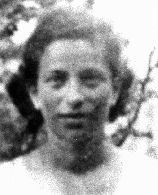
-
Johanna Falkenstein Heumann
ID CardThe oldest of five children, Johanna was born to Jewish parents living in a small town near Cologne. Her father owned a cigar factory. After Johanna graduated from high school, she worked in a bank in Cologne. At 22 she married Carl Heumann and the couple settled in the village of Hellenthal near the Belgian border. There they owned a general store. The couple had two daughters, Margot and Lore. 1933-39: A year ago Johanna's family moved to nearby Bielefeld, and she enrolled Margot and Lore in the city's…
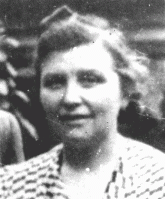
-
Sarah Rivka Felman
ID CardOne of seven children, Sarah was raised in a Yiddish-speaking, religious Jewish home in Sokolow Podlaski, a manufacturing town in central Poland with a large Jewish population of some 5,000. Sarah's parents ran a grain business. In 1930, Sarah began attending public elementary school in Sokolow Podlaski. 1933-39: After graduating from middle school in 1937 at the age of 14, Sarah helped out her now widowed mother in the family's grain business. Two years later, Germany attacked Poland. German aircraft…
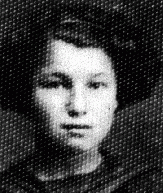
-
Chinka Schwarzbard Felman
ID CardOne of six children, Chinka was raised in a Yiddish-speaking, religious Jewish family in the town of Ostrow Mazowiecka, where her father was a wine maker. In 1910 she married Ephraim Isaac Felman, and a few years later the couple moved to Sokolow Podlaski, where Chinka helped her husband run a grain business. The Felmans had seven children, two of whom died in infancy. 1933-39: Chinka's husband died in 1935, and she took over the grain business with the help of her children. That same year, her oldest…
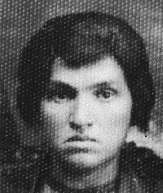
-
Fischel Felman
ID CardFischel was the oldest of seven children in a Yiddish-speaking, religious Jewish family. When he was a small child, his parents moved the family to Sokolow Podlaski, a manufacturing town in central Poland with a large Jewish population of about 5,000. Fischel was sent to study at a religious school. In 1932, when he was 21 years old, Fischel was inducted into the Polish army. 1933-39: After two years in the Polish cavalry, Fischel returned to Sokolow Podlaski, where he apprenticed to become a carpenter…
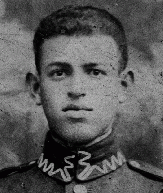
-
Moishe Felman
ID CardThe youngest of seven children, Moishe was raised in a Yiddish-speaking, religious Jewish home in Sokolow Podlaski, a manufacturing town in central Poland with a large Jewish population of some 5,000. Moishe's parents ran a grain business. Moishe attended a Jewish school and began public school in Sokolow Podlaski in 1933. 1933-39: Summer vacation had just finished and 13-year-old Moishe was about to begin another year at elementary school when the Germans invaded Poland on September 1, 1939. German…
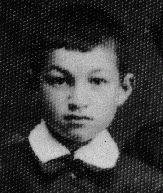
-
The "We Will Never Die" Pageant
Article"We Will Never Die" was a 1943 musical stage performance that raised awareness among Americans about the murder of European Jews. Learn more.
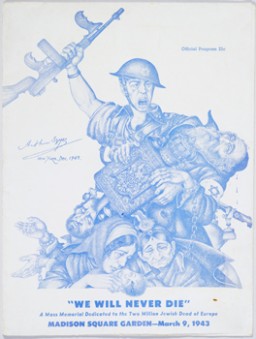
-
Defendants enter pleas at Nuremberg Trial
FilmAfter the defeat of Germany, the Allies tried leading state and party officials and military commanders of the Third Reich before a tribunal of military judges from the Soviet Union, Great Britain, France, and the United States. This International Military Tribunal tried 22 major war criminals during what is commonly known as the Nuremberg Trial, which lasted from November 1945 to October 1946. This footage shows the accused entering pleas following their indictment on charges of crimes against peace, war…
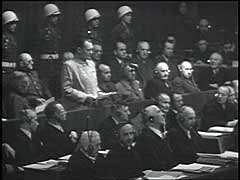
-
Henry J. Kellermann describes the reactions of defendants during the Nuremberg Trial
Oral HistoryHenry received a Doctor of Law (J.D.) degree from the University of Berlin in 1937. Sponsored by the rabbi of the Baltimore Hebrew congregation, Henry immigrated to the United States in the same year. In 1945, the Office of Strategic Services (OSS) assigned him to prepare pre-trial briefs for the International Military Tribunal held in Nuremberg, Germany. He interrogated a number of witnesses and defendants. After the war, he held various diplomatic posts.
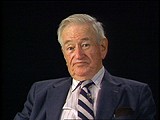
-
Testimony on the Escape from the Mir Ghetto by Eliezer Breslin
ArticleRead a summary extract from Eliezer Breslin’s testimony on escaping from the Mir ghetto, given during the WWII war crimes investigation into Semion Serafinowicz.
